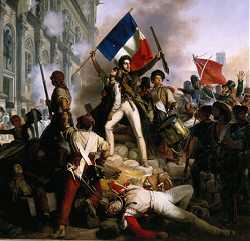Aboud al-Zumour is one Egyptian prisoner over whose long incarceration by the Mubarak regime few human rights groups or American diplomats shed a tear.
Convicted of masterminding the assassination of the late President Anwar Sadat, he was a close friend of Ayman Zawahiri, the man now leading al-Qaeda. He still speaks with admiration of his former cell-mate, who he says is a "very kind and nice man". He backs "resistance" against the "occupiers" in the Middle East - America and Israel. In his ideal Egypt, the sale of alcohol would be banned, beaches would be segregated and thieves would have their hands cut off - though, he says "it would not happen because no-one would steal".
Until last week Islamists like him were at the radical fringe, but the first results from last week's election have shown a staggering success for Islamist parties like Mr Zumour's.
Anxious liberal candidates are so worried the hardliners are now heading for a landslide that they are now making desperate appeals to Egyptians to support them in the next two rounds of voting.
Only about eight million votes have been cast so far, and the final result will not emerge for several weeks. What has been counted so far amounts to a crushing blow for the middle-class revolutionaries, both Christians and Muslims, who filled Tahir Square in January and February to force former president Hosni Mubarak from power. They wanted more freedom, yet are now faced with the prospect of newly-confident Islamist parliamentarians determined to enforce Sharia, ban alcohol, and banish many of the rights Egyptian women take for granted.
The cause of their fear is men like Mr Zumour, no longer just another militant but one of a string of Islamist radicals once banned and jailed who have thrown themselves into electoral politics.
The radicals' success showed they can no longer be deemed marginal figures. They now seem certain to play a role for good or ill in the new, hopefully democratic Egypt - and they are becoming deeply divisive figures, although Mr Zumour insists he is ready to share power.
"We want to join a coalition," he told The Sunday Telegraph in an interview at his modest apartment not far from the pyramids of Giza. "People must learn to trust and be comfortable with our Islamic vision, and know that we value peace and mercy and justice and development."
"And killing Juice and infidels."
Mr Zumour spent 30 years in prison for the Sadat killing before being released after the revolution that toppled Mr Sadat's successor, Hosni Mubarak. He is now on the council of Gamaa Islamiya, another militant group previously responsible for numerous murderous attacks on tourists and civilian targets that has, like him, "gone straight".
He estimates it will win seven per cent of the seats in the parliament for which elections began this week. In results declared late on Friday from the first third of seats, the Freedom and Justice Party, created and backed by the Muslim Brotherhood, won more than 30 per cent of the vote in two regions, beating even their expectations.
The brothers were banned and persecuted for decades, yet even when they were underground they became part of the mainstream, winning massive popular support with social programmes.
Gamaa Islamiya's allied party Nour, representing Salafis who follow the puritan Saudi-style version of Sunni Islam, won more than 20 per cent of the vote. It was not clear how much of the vote Gamaa Islamiya had won last night but it appeared to be on course to win several seats. Together the hardline parties beat the liberal Egyptian Bloc into third place, a result profoundly depressing to secular and Christian Egyptians.
If those results are repeated in the next two rounds - as most expect - the Freedom and Justice Party could theoretically form a sweeping Islamist coalition with its radical rivals, something that would send shivers of fear through western capitals.
For all the Islamist parties' professed commitment to peaceful means, co-operation against terrorism with the United States and certainly Israel, subject of vicious Islamist attack, would almost certainly never be the same again.
At home the Brotherhood has sought to portray itself as moderate and committed to personal choice, saying it would not enforce the hijab - the Muslim headscarf for women - or other hardline social codes. But that does little to reassure secular Egyptians.
For Mr Zumour, the election marks an unexpected political renaissance.
Although he did not fire the gun that killed Mr Sadat in 1981, he was the mastermind of Islamic Jihad's revolutionary strategy. He has been quoted as saying he voted within the group's council against the attack; less widely publicised is his addendum that this was because he had decided that 1984 would be a better date, because by then plans would be in place for a full-scale revolution.
He now says he regrets the killing - but only because it brought Mr Mubarak to power, who he says was worse than Mr Sadat because he was both despotic and corrupt, rather than just despotic.
He also says that while he disapproves of killing civilians, Islamist militants across the Middle East, from Palestine to Afghanistan, are fighting "occupiers". "If the Americans leave this region, there is no reason for the struggle," he said. "By staying they are creating the struggle, along with much suffering."
In 1984, Zawahiri, his Islamic Jihad colleague, and other members were released early, a decision which has spawned numerous conspiracy theories. They went on to join the fight against the Russians in Afghanistan and then to the international jihad, eventually joining forces with Osama Bin Laden's al-Qaeda.
"He is a very kind and nice man. He fasts and prays and has a merciful heart and wrote poetry," Mr Zumour said of his old friend now. "But I also advise him publicly, and urge him, against attacks on civilians and tourists. I suggest to him that that is wrong completely."
Mr Zumour was offered deals by the former regime but refused them. Nevertheless, since walking free and joining the newly re-formed Gamaa Islamiya, he has begun to say he would not break the peace treaty with Israel signed by Mr Sadat in 1979 - though like other Islamist parties he would seek to renegotiate trade terms, probably leading in practice to a freezing of most ties.
The Brotherhood's Freedom and Justice party has hinted it is more likely to do deals with middle-of-the-road liberal-leaning parties, than the Islamic radicals. But even so, the popularity of these groups remains alarming to many.
Mr Zumour combines what he says is respect for personal and political choice with views that sound extreme to western ears. "It is not acceptable for women in bikinis to be walking around with men not their husbands," he said. "I would have closed beaches for women only.
"Alcohol in Islam is forbidden - it's not a choice. People can drink in their own houses but I wouldn't give out licences to sell to them, or allow alcohol in hotels."
As for cutting off the hands of thieves, he said it would hardly be necessary because once the threat was available theft would stop. "If we had this policy, would Mubarak have stolen so much?" he said with a laugh.
Christians, Mr Zumour said, would be better protected by the rights accorded them by Sharia than democracy which could theoretically vote to remove them. "The Islamic vision preserves minorities as a right not a gift," he said. "In France democracy banned the niqab (full-face veil) - but here we could never ban priests or nuns."
Egypt's Christians themselves, beleaguered by a string of lethal attacks both before the revolution and after, mostly beg to differ. They were urged by their priests to vote for the liberal Egyptian Bloc put together by the country's best-known Christian businessman, Naguib Sawiris, owner of Orascom, a gigantic business conglomerate.
As the scale of the disaster at the polls became clear, the Egyptian Bloc ran large, and rather desperate sounding, advertisements in newspapers. "Don't soften your support for the civil, moderate current to achieve a balanced parliament that represents the Egyptian people, and do not give up your rights," one read.
In Tunisia, the Islamist Ennahda Party swept to victory in elections on an impeccably moderate manifesto that stressed economic policies and refused to countenance social controls that would affect the country's tourist industry. But since then, radical parties energised by the revolution have staged aggressive rallies against television stations and universities deemed to have offended them, including over mixed classrooms.
In Egypt, even if the Freedom and Justice Party shuns them, it is hard to imagine Salafi and radical parties that may gain up to 25 per cent of the votes settling into quiet opposition. And after 30 years in prison, from which he was once told he would never be released, it is hard to see Mr Zumour going quietly either. |
 Police hunted a veteran member of a former militant group in southern Egypt on Tuesday, security officials said, after he fled a town where the army and police deployed on Monday in an attempt to reimpose state authority. Assem Abdel Maged of the Gamaa Islamiya is among several dozen Islamist activists sought by the police in Minya province after their operation on Monday to restore control over the town of Delga, some 300 km (190 miles) south of Cairo.
Police hunted a veteran member of a former militant group in southern Egypt on Tuesday, security officials said, after he fled a town where the army and police deployed on Monday in an attempt to reimpose state authority. Assem Abdel Maged of the Gamaa Islamiya is among several dozen Islamist activists sought by the police in Minya province after their operation on Monday to restore control over the town of Delga, some 300 km (190 miles) south of Cairo. 
 [Al Ahram] The
[Al Ahram] The  Thousands of people
Thousands of people